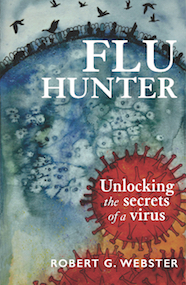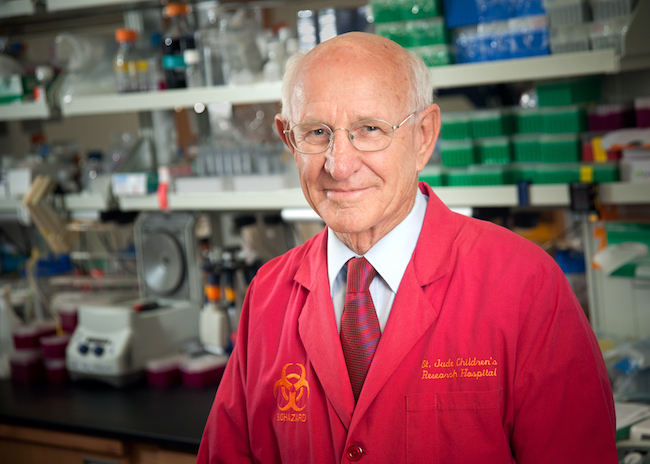 Flu Hunter is Robert G Webster's gripping, first-person account of the tenacious scientific detective work involved in revealing the secrets of this killer virus.
Flu Hunter is Robert G Webster's gripping, first-person account of the tenacious scientific detective work involved in revealing the secrets of this killer virus.
The question uppermost in my mind as we look at the past 100 years of influenza pandemics, epidemics and control strategies is whether another pandemic like the 1918 Spanish influenza, with such a deadly and disruptive impact on society, is possible. The answer is yes: it is not only possible, it is just a matter of time.
It's one of the great fears of our time: will we be struck down by a pandemic to rival that of the 1918 Spanish influenza virus? Dr Robert Webster, dubbed 'the flu hunter' by Smithsonian Magazine, answers that question with some authority in his accessible, riveting and eponymously named book, Flu Hunter.
Flu Hunter is Webster's gripping, first-person account of the tenacious scientific detective work involved in revealing the secrets of this killer virus.
As Michael Baker, Professor of Public Health at the University of Otago described it, “if Tolkien were a virologist, this is the sort of book he would write. An expansive, global story of adventure, discovery and unexpected encounters with microbes and their hosts. The difference is that this story is true!”
The Flu Hunter by Robert G. Webster | Published by Otago University Press | September 2018 | rrp$35
Author Robert G Webster
Born on a farm in Balclutha, an alumnus of the University of Otago, now working in infectious diseases at St Jude Children's Research Hospital in Memphis, Tennessee, it's been Webster's life's work to figure out where pandemic influenza viruses come from and how do they spread to humans. In so doing he has made a remarkable contribution to our understanding of the evolution of influenza viruses and how to control them.
Dr Webster began his research in the early 1960s with the insight that the natural ecology of most influenza viruses is among wild aquatic birds. Painstaking tracking and testing of thousands of birds eventually led him and the other scientists involved to establish a link between these bird virus 'reservoirs' and human influenza pandemics.
We learn about some of the fascinating scientific work involved in Webster's research, including exhuming bodies of Spanish flu victims from the Arctic permafrost in a search for tissue samples containing genetic material from the virus.
In his book, Webster says it is sobering to realise that, after nearly 100 years of studying the 1918 influenza, we still do not know precisely why the virus was such a killer. “We have made huge advances in our understanding, and in the development of medicines and vaccines, but we are not there yet.”
“More research is vital,” he says. “You could have a universal vaccine in one shot, like with the measles.”
Commentary
“In this very valuable book Rob Webster, mentor to influenza researchers all over the world, describes a lifetime of work on influenza viruses.” Masato Tashiro, Former director, WHO Collaborating Centre for Reference and Research on Influenza, Tokyo.
“Flu Hunter is an exciting story of scientific curiosity and discovery by one of the world's leading authorities on the origin of influenza viruses”. Geoffrey Rice, Professor Emeritus University of Canterbury.
“Flu Hunter chronicles the career of an outstanding global scientific leader. It is a book that will appeal equally to students and scientists familiar with the field, and lay readers. I heartily commend it to all.” Lance C. Jennings, chair, International Society for Influenza and other Respiratory Diseases.
Bird flu pioneer
Robert G Webster is a world-renowned virologist and international expert in influenza who was among the first scientists to acknowledge a link between human and avian flu. His team isolated and identified the avian-adapted strain of H5N1, the causative agent of H5N1 flu commonly known as avian influenza or 'bird flu'.
His distinguished career began in Otago. Born in Balclutha, he grew up on a farm before studying microbiology at the University of Otago. For the past few decades he has worked in infectious diseases at St Jude Children's Research Hospital in Memphis, Tennessee. He has published over 600 original articles and reviews on influenza viruse and has held research posts in New Zealand, Australia and the United States. Now in his eighties, Dr Webster still travels the world addressing conferences and scientific gatherings.
Robert Webster is an Honorary Fellow of the Royal Society of NZ, a Fellow of the Royal Society of London and a Member of US Academy of Sciences. He gave his name to the Webster Centre for Infectious Diseases and Webster Family Chair for Viral Pathogenesis in Otago.

